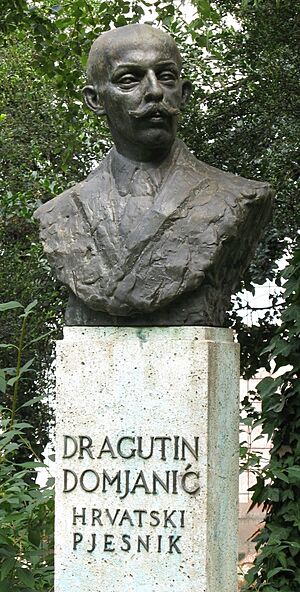Dragutin Domjanić facts for kids
Quick facts for kids
Dragutin Milivoj Domjanić
|
|
|---|---|

Domjanić's bust in Strossmayer Square, Zagreb
|
|
| Born | 12 September 1875 Krči, Croatia-Slavonia, Austria-Hungary (now Adamovec, Croatia) |
| Died | 7 June 1933 (aged 57) Zagreb, Yugoslavia (now Zagreb, Croatia) |
| Occupation | Poet |
| Language | Croatian |
| Nationality | Croat |
Dragutin Milivoj Domjanić (born September 12, 1875 – died June 7, 1933) was a famous Croatian poet. He is well known for his beautiful poems like "Fala" and "Popevke sam slagal." Many of his works were written in the special Kajkavian dialect of the Croatian language.
About Dragutin Domjanić
Domjanić was born in Krči, a small village near Sveti Ivan Zelina in Croatia. He studied law and later worked as a judge in Zagreb. He also served as a special advisor for the Ban's Bench, which was an important court.
He was a member of the Yugoslav Academy of Sciences and Arts. This was a very important group for smart people in the region. He also led Matica hrvatska, a cultural organization, from 1921 to 1926. He was also the president of the Yugoslav PEN Club, which is a group for writers.
Domjanić loved to write about spiritual love and the elegant life of old noble families. He often felt sad about how the world was changing. He sometimes worried about new, rougher ideas.
His Poetry
Domjanić mostly wrote his poems in the Kajkavian dialect. This was a special way of speaking Croatian, especially in his home region. Even though he spoke the Kajkavian dialect of Adamovec, his poems used the more formal Kajkavian literary language.
Two of his most famous poems are "Fala" and "Popevke sam slagal." These poems were so popular that they were turned into songs by the composer Vlaho Paljetak. Another Croatian composer, Ivana Lang, also set some of his poems to music.
Domjanić also wrote a puppet play called Petrica Kerempuh and the Smart Ass. He used the pseudonym Vujec Grga for this play. Some of his poems were even translated into Esperanto, a language created to be easy for everyone to learn.
He passed away in Zagreb.
Main Works
- Poems (in Štokavian Croatian: Croatian: Pjesme), published in 1909
- Statues and Songs (in Kajkavian Croatian: Croatian: Kipci i popevke), published in 1917
- In Sun and Shadow (in Kajkavian Croatian: Croatian: V suncu i senci), published in 1927
- Through Dear Land (in Kajkavian Croatian: Croatian: Po dragomu kraju), published in 1933
 | Stephanie Wilson |
 | Charles Bolden |
 | Ronald McNair |
 | Frederick D. Gregory |

